The Chromebook Pixel (2015) Review
by Brandon Chester on March 16, 2015 8:00 AM EST- Posted in
- Laptops
- Chrome OS
- Chromebook
- Chromebook Pixel
CPU Performance
Chrome OS is extremely lightweight, which makes sense for an operating system that has to run on processors that range from Intel's Core i7 at the high end, to Intel Atom and ARM processors at the low end. Most devices running Chrome OS are closer to that lower end, and that coupled with the web application nature of Chrome OS doesn't make it a large target for benchmark developers. The situation is arguably even worse than mobile benchmarking since the only benchmarks a device can be tested in are web benchmarks, but we have to work with what we have. The new Chromebook Pixel is powered by Intel's Core i5-5200U processor, which is one of Intel's new Broadwell-U parts.
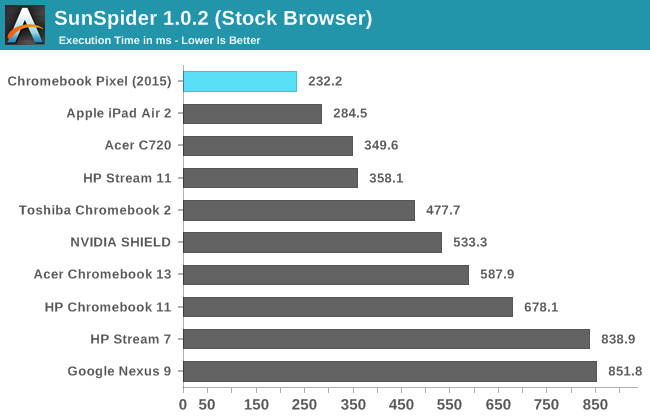
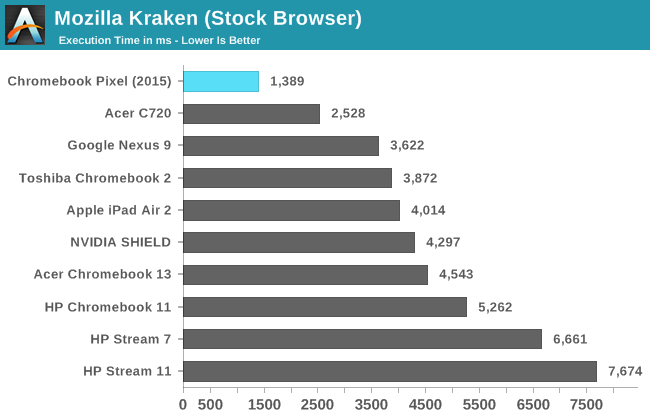
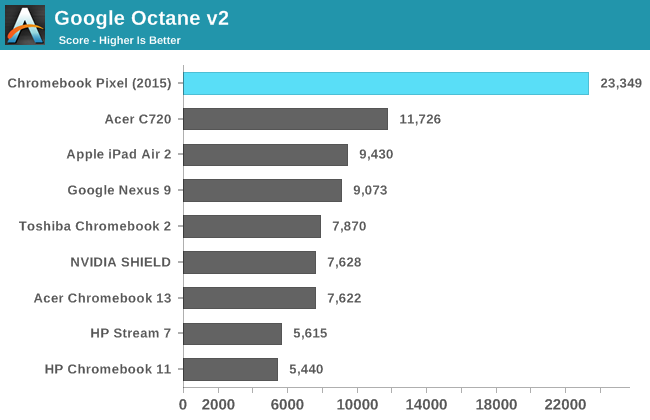
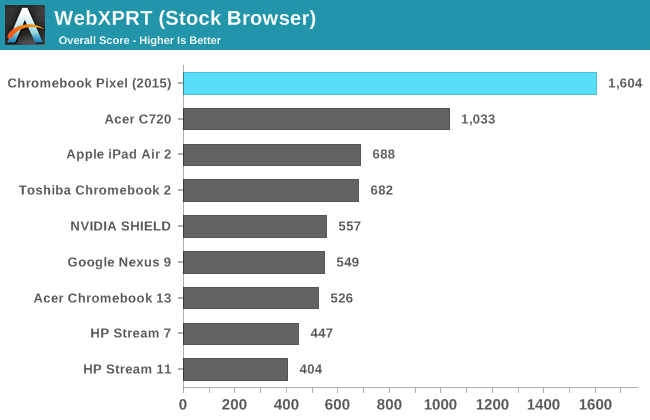
| Additional Performance Results | ||||
| Acer C720 | Acer CB13 | Toshiba Chromebook 2 | Chromebook Pixel (2015) | |
| CrXPRT | 96 | 55 | 61 | 161 |
| Spacerocks (WebGL - FPS) | 18 | 30 | 11 | 45 |
The CPU performance of the original Pixel could be described as completely overkill for running Chrome OS, and the same is true for this year's iteration. The Pixel gives you whats is undoubtedly the smoothest and fastest Google Chrome experience available. While I find the performance of an Intel i5 to be unnecessary to do something as simple as run Chrome and web apps, it definitely comes in handy if you're running some other version of Linux overtop of Chrome OS.
WiFi Performance
The 2013 Chromebook Pixel had dual spatial stream 802.11n WiFi and Bluetooth 3.0. In early 2013, this was fairly common among laptops, although 802.11ac adoption on high end laptops began not long after. The 2015 Chromebook Pixel uses Intel's Intel 7260 WiFi + BT 4.0 module, with 2x2 802.11ac support. This brings the max theoretical WiFi speed up to 866Mbps, a substantial improvement over the 300Mbps max on the 2013 model. Real world performance will almost always be lower than theoretical maximums, and to test WiFi performance I've used iPerf to get an idea of what the maximum throughput is on the Pixel.
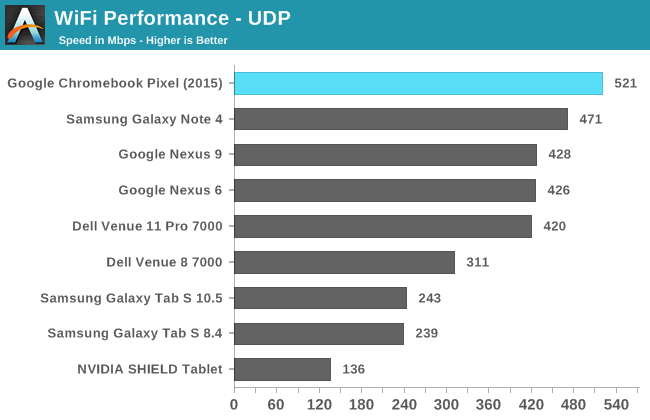
In most of our tests I've compared the Pixel to other Chromebooks, tablets, and smartphones. This is mostly due to the previously mentioned benchmarking limitations on Chrome OS. To keep consistent with this, and to avoid making unfair comparisons to laptops which aren't tested using iPerf, I've just run the Pixel through our smartphone/tablet WiFi benchmark. This still gives an idea of how fast the Pixel is, without comparing it to other laptops that were not tested in the exact same manner.










123 Comments
View All Comments
Sushisamurai - Monday, March 16, 2015 - link
Just nit picking, but for the battery / charge time section, I think you should add a chart for normalized values, to compare efficiency - I think it'd be neat to see how efficient these new laptops are getting (it's the new trend!)Sushisamurai - Monday, March 16, 2015 - link
But yeah, cool read. If it didn't have chrome book logo written on it, i think I might just mistake the keyboard/trackpad design for a Macbook design. The body could use some contours IMO. That LED light bar is a novel ideaandychow - Monday, March 16, 2015 - link
My only real complaint is the lack of "page-up/page-down" buttons. They had the space left and right of the "up" button. I use those a lot normally. I know you can do alt-up or alt-down, but, I would like those buttons.Otherwise, great device that fixes the only real problem with the first one: the battery life.
I can't find this on the google store, but as soon as it's there I'm buying one.
Brandon Chester - Monday, March 16, 2015 - link
Are you in the US or UK? It should be available there right now.melgross - Monday, March 16, 2015 - link
"All these little details result in a really unique design, and its been clear since the original Pixel that Google wanted to create their own device instead of just carbon copying another laptop"Well, as this looks almost exactly like a Macbook Pro to most people, I wouldn't say that it's so original. It seems that to pc makers, and now this extends to Google's Chrome efforts, being "original" means copying Apple (again).
Yes, I expect to get flamed here, but that doesn't change the facts.
Brandon Chester - Monday, March 16, 2015 - link
I have both Retina MacBook Pros and the Pixel is distinctly different in many ways.aliasfox - Monday, March 16, 2015 - link
As someone who's seen and used a variety of different MacBooks as well as the first generation Pixel, I'll say that if a Retina MacBook Pro makes the average laptop look cheap and chintzy, then the Pixel makes the rMBP look and feel like a low-effort design. The Pixels that I've handled and seen seem to have tighter tolerances and lower torsional flex than even the unibody MacBooks, which make them seem even more 'hewn from one piece of metal' than Apple's products do.In terms of look and feel, if the average laptop was a Toyota Corolla and a MacBook Pro was an Audi A6, then the Pixel is like a Mercedes Benz S-Class. It really is very noticeable.
MykeM - Tuesday, March 17, 2015 - link
Knowing Mercedes, the attention to details cover more than just the exterior design but also the engine or the engineering throughout the entire vehicle. If you look at the typical Mercedes, it would look something like this:http://i.imgur.com/DQg0bp4.jpg
Now if you look inside a Chromebook, you'll see this:
http://i.imgur.com/V9BVu2N.jpg
http://i.imgur.com/ZnK3YTJ.png
And compare it to the inside of a Retina MacBook Pro:
http://i.imgur.com/O5LcAHg.jpg
Now tell me again which of the two is the Mercedes and the Toyota Prius?
http://i.imgur.com/Ua07lwU.jpg
Braincruser - Monday, March 16, 2015 - link
This is a price range for many gaming laptops. Infinitely more powerful, better storage AND better facebook machine.MantasPakenas - Monday, March 16, 2015 - link
Nice review. However, I see a couple of glaring issues I'd like to see addressed:Even though you criticize the Pixel, even if indirectly, for running a somewhat limited OS for this price bracket, you (and to be fair, most other reviewers) fail to mention it's one huge advantage (given the limitations) - killer security features and 0 hassle with updates or almost anything else OS related. That's worth a lot to a lot of people, even if most of them look for something much cheaper.
Pardon, but I just don't see how benchmarking the Pixel against tablets and vastly cheaper and inferior Chromebooks makes any sense at all. This is, after all, an ultrabook, and one costing $1000 or more. These benchmarks give me somewhere around 10% of (somewhat) useful information, and omit the 90% of the really important one. I can understand how including one or two more powerful Chromebooks makes sense as a baseline, but this laptop has a display, battery, and processor that needs to be compared only agains Macbook Pros, Airs, Lenovo Yoga Pros and Dell XPS 13s! Especially since this is targeted at developers and these guys are more than likely to run at least Linux on it, doing most of the same tasks they would do on their Windows or OSX machines.